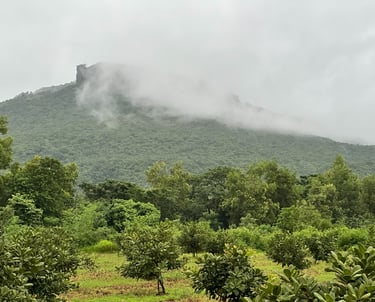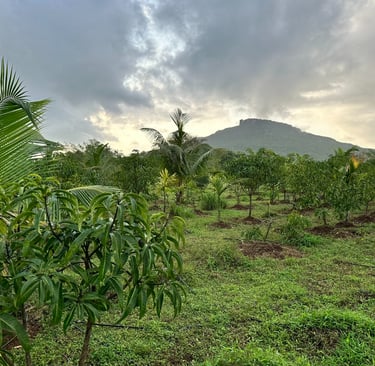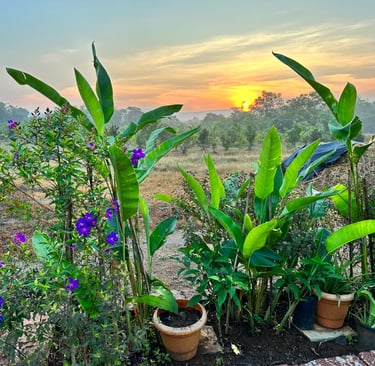The Roots of Suresh Shrushti Farm
A Tale of Passion, Perseverance, and Organic Bounty
Nestled in the lush, verdant hills of Sindhudurg, Maharashtra, lies a haven of organic goodness - Suresh Shrushti Farm. This isn't just a farm; it's a living testament to one man's vision, a family's dedication, and nature's boundless generosity. The story of Suresh Shrushti Farm is one of homecoming, of rediscovering roots, and of nurturing a deep connection with the earth.


A Policeman's Return to His Roots
Suresh Keshav Rane was no ordinary farmer. For years, he had served as a distinguished police officer in the bustling metropolis of Mumbai. His days were filled with the clamor of city life, the weight of responsibility heavy on his shoulders. But beneath the crisp uniform of a law enforcer beat the heart of a man deeply connected to the soil.
As retirement approached, Suresh found himself drawn back to his birthplace - a small, picturesque village called Aachirne in Sindhudurg. The call of the land was strong, echoing memories of his childhood spent amidst nature's bounty. It was a call he could no longer ignore.
The Seeds of a Dream
In 2021, as the world grappled with the unprecedented challenges of the COVID-19 pandemic, a realization dawned upon many - the importance of self-sufficiency, especially in food production. For Suresh, this global crisis crystallized a long-held dream. He envisioned an orchard, not just any orchard, but a diverse haven of local fruits cultivated using ancient, cow-based agricultural methods.
With unwavering determination, Suresh set out to transform his ancestral land. The orchard he planned was a celebration of Maharashtra's rich biodiversity - mangoes of various varieties, cashews, coconuts, areca nuts, guavas, chikoos, lemons, jamuns (Indian blackberries), and jackfruits. Each tree planted was not just a fruit bearer but a step towards preserving the region's agricultural heritage.


A Family United by the Land
Suresh's vision found eager supporters in his two sons. Despite their corporate backgrounds, they had always harbored a deep interest in agriculture and its innovations. They formed a formidable team with their father, bringing modern knowledge and techniques to complement Suresh's traditional wisdom. This blend of old and new became the cornerstone of Suresh Shrushti Farm's unique approach.
Mrs. Sunita Rane, Suresh's wife, became an integral part of this green revolution. She immersed herself in the day-to-day operations of the farm, her nurturing instincts extending from family to flora. Together, the couple developed a disciplined daily routine, rising with the sun to tend to their plants, which they lovingly regarded as their own children.


Harmony with Nature
The Sindhudurg region, blessed with a tropical climate, proved to be the perfect canvas for Suresh's organic farming methods. The warm temperatures and generous rainfall created ideal conditions for a wide variety of fruits to flourish. However, Suresh understood that true harmony with nature meant more than just leveraging favorable weather.
Central to the farm's philosophy was the integration of cows into the agricultural ecosystem. These gentle creatures became more than just livestock; they were partners in cultivation. Suresh and his family took joy in grazing the cows, understanding the vital role these animals played in traditional Indian agriculture.
The cows' contribution went beyond mere companionship. Their waste became the foundation for organic fertilizers and pesticides, eliminating the need for harmful chemicals. This approach not only produced healthier crops but also nurtured the soil, preserving its vitality for future generations.
Guardians of Biodiversity
As the farm grew, so did its impact on the local ecosystem. The diverse orchard became a sanctuary for various bird species, filling the air with melodious chirping. Bees and butterflies, nature's pollinators, found a haven among the blossoming fruit trees. Suresh observed with delight how this increase in biodiversity led to a natural balance, with birds and beneficial insects helping to control pests without the need for chemical interventions.
The farm's commitment to natural farming methods played a crucial role in soil conservation. By avoiding chemical fertilizers and pesticides, Suresh ensured that the soil remained alive, teeming with microorganisms essential for plant health. This living soil not only produced more flavorful and nutritious fruits but also showed remarkable resilience to changing weather patterns.


Preserving Heritage, Embracing the Future
For Suresh, Suresh Shrushti Farm was more than just a retirement project; it was a mission to preserve and promote India's rich agricultural heritage. He saw himself as a custodian of ancient wisdom, keeping alive farming practices that had sustained communities for centuries. Yet, he was not resistant to innovation. The farm became a testing ground for new, eco-friendly farming techniques, always with the goal of working in harmony with nature rather than against it.
Water conservation became another focal point of the farm's practices. Inspired by traditional water harvesting methods, Suresh implemented systems to capture and utilize rainwater efficiently. This not only ensured a steady water supply for the orchard but also contributed to the region's groundwater recharge.
A Legacy of Sustainability


As the farm grew, so did its impact on the local ecosystem. The diverse orchard became a sanctuary for various bird species, filling the air with melodious chirping. Bees and butterflies, nature's pollinators, found a haven among the blossoming fruit trees. Suresh observed with delight how this increase in biodiversity led to a natural balance, with birds and beneficial insects helping to control pests without the need for chemical interventions.
The farm's commitment to natural farming methods played a crucial role in soil conservation. By avoiding chemical fertilizers and pesticides, Suresh ensured that the soil remained alive, teeming with microorganisms essential for plant health. This living soil not only produced more flavorful and nutritious fruits but also showed remarkable resilience to changing weather patterns.
Organic
Nutrient-rich fruits from our natural farm.
Sustainable
Natural
+919769093810
© 2025. All rights reserved.
